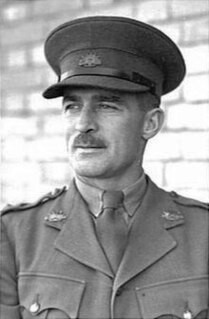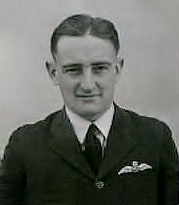
Dame Annie Florence Gillies Cardell-Oliver, DBE was a Western Australian politician and political activist, often known publicly as simply Florence Cardell-Oliver.

Lieutenant General Sir Reginald George Pollard, was a senior commander in the Australian Army, serving as Chief of the General Staff from 1960 to 1963. Born in Bathurst, New South Wales, Pollard graduated from the Royal Military College, Duntroon, in 1924. A regular officer, he served as adjutant/quartermaster in several battalions of the Citizens Military Forces (CMF) during the 1920s and 1930s. In 1938, he was posted to England to undertake staff training, which was cut short by the outbreak of the Second World War. Pollard joined the Second Australian Imperial Force in 1940, and the following year saw action with the 7th Division in the Middle East, where he was mentioned in despatches. Promoted to colonel in 1942, he became senior staff officer of the 7th Division in New Guinea, and was awarded the Distinguished Service Order for his actions. He spent much of the remainder of the war in staff and training positions in Australia.
Sir Edward John Bunting was an Australian public servant and diplomat, whose senior career appointments included Australian High Commissioner to the United Kingdom and Secretary of the Department of the Prime Minister and Cabinet.
Major General Sir William Dudley Duncan Refshauge, AC, CBE, ED, FRSH, FRCOG was an Australian soldier and public health administrator. He was Honorary Physician to Queen Elizabeth II (1955–64), Director-General of the Australian Government Department of Health (1960–73), and Secretary-General of the World Medical Association (1973–76).

Royal Canberra Hospital was the first hospital in Canberra, the capital of Australia. It opened in 1914 on the Acton Peninsula, as the Canberra Community Hospital. It grew to become the major hospital in Canberra before being closed in 1991 and later demolished in 1997.

Colonel Sir Edward Ford, was an Australian soldier, academic and physician. He played an important role in the anti-malaria campaign in the South West Pacific Area during the Second World War, and in preventative medicine in Australia after the war, but is best known for his Bibliography of Australian Medicine.

Air Vice Marshal Frank Headlam, was a senior commander in the Royal Australian Air Force (RAAF). Born and educated in Tasmania, he joined the RAAF as an air cadet in January 1934. He specialised in flying instruction and navigation before the outbreak of World War II. In April 1941, he became commanding officer of No. 2 Squadron, which operated Lockheed Hudsons. The squadron was deployed to Dutch Timor in December, and saw action against Japanese forces in the South West Pacific. After returning to Australia in February 1942, Headlam held staff appointments and training commands, finishing the war a group captain.
Sir William Ernest Dunk, (1897–1984) was a senior official in the Australian Public Service.
Sir Henry Armand "Harry" Bland was a senior Australian public servant. He was Secretary of the Department of Defence from 1968 to 1970.
Sir Louis Francis Loder was a senior Australian public servant and policymaker. He was head of the Department of Works between 1945 and his retirement in 1961.
Francis Harry "Frank" Rowe was a senior Australian public servant, best known for his time as Director-General of the Department of Social Services.
Dr Frank "Doc" McCallum was a senior Australian public servant and medical practitioner, best known for his time as Director-General of the Department of Health.
John Howard Lidgett Cumpston was a senior Australian public servant, and first Director-General of the Department of Health.
Lawrence John "Lawrie" Willett is a former senior Australian public servant and university Chancellor.
George Gribbon Sutcliffe was a senior Australian public servant, best known for his time as a Commissioner of the Commonwealth Public Service Board.
Sir Edwin McCarthy was a senior Australian public servant and diplomat. He was a prominent senior trade official, including as head of the Department of Commerce and Agriculture between 1945 and 1950.
Sir Edward Ronald Walker, generally known as Ronald Walker, was an Australian diplomat and economist who served as Australia's Permanent Representative to the United Nations and Ambassador to Germany, Japan, and France.
Sir Francis Anthony "Frank" Meere was a senior Australian public servant. He was Comptroller-General of Customs between 1952 and 1960, heading first the Department of Trade and Customs and then the Department of Customs and Excise.

Ellen Mary Stack is an Australian medical doctor and the first female Lord Mayor of an Australian capital city. She was the first Lord Mayor of Darwin, Northern Territory from 1975 to 1980. She is best known for her work following the destruction of Darwin due to Cyclone Tracy.







